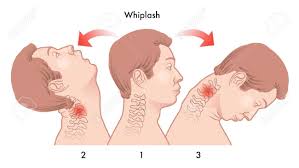What is whiplash?
Whiplash is an injury to the tendons, muscles, and soft tissues of the neck. It is always caused by a vigorous and rapid movement of the head, backwards, forwards, or side-to-side.

When you experience a vigorous movement of your head, the soft tissues in your neck may get overstretched or sprained. This is what will cause the pain and discomfort in your neck and shoulders and sometimes result in back pain, too.
For a rapid recovery, physiotherapy is recommended early on with this kind of injury.
What are the early signs and symptoms of whiplash?
After your injury, you may experience the following symptoms:
- Neck pain
- Headache
- Arm weakness
- Pain worsening with neck movement
- Loss of range of motion in the neck
- Ringing in the ears (tinnitus)
- Pain in your shoulder, upper back, or arms
- Dizziness
- Fatigue
- Back pain
What causes whiplash?
Whiplash normally occurs when you have an accident, most commonly a car accident when your vehicle is struck by another vehicle from behind. The rear impact can cause your head and neck to be jerked vigorously which will lead to discomfort and pain.
Another reason is a sudden blow to your head from a sporting injury or a falling heavy object. Falling over and jolting your neck/head can also bring on whiplash.
How long does it take to recover from whiplash?
Many people who have whiplash will start to feel better within a few weeks of the injury and usually do not have any long-lasting effects. There is a small percentage of people who will continue to have pain for several months or years after the injury. Everyone is different and it may be very hard for your doctor to predict your recovery time.
What is the treatment for whiplash?
Years ago, whiplash was treated with immobilisation and the doctor would put you in a cervical collar. Today it is encouraged to get an early range of motion in your neck and start physiotherapy as soon as possible to encourage strong and flexible muscles.
Pain relief is recommended along with ice and heat therapy. Pain injections may be considered at a later stage for further relief.
How physiotherapy can help your whiplash
We will do whatever we can to get you on the fastest route to recovery. Some of the treatment methods we use include:
- Mobilisation
- Strengthening exercises
- Myofascial trigger point release
- Pilates
- Cross-friction massage
- Stretching and range of movement exercises
- Acupuncture
- Functional exercises
- Kinesio-taping
